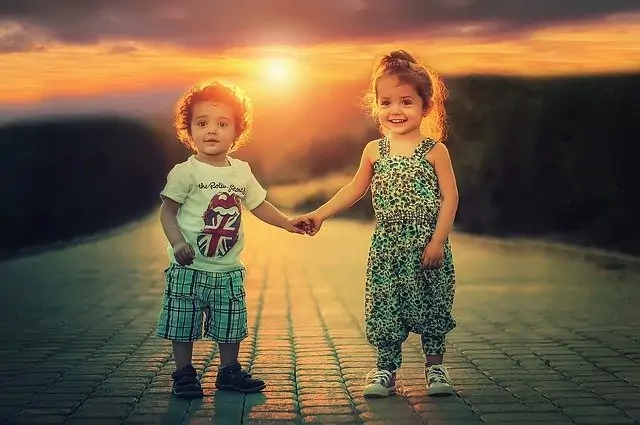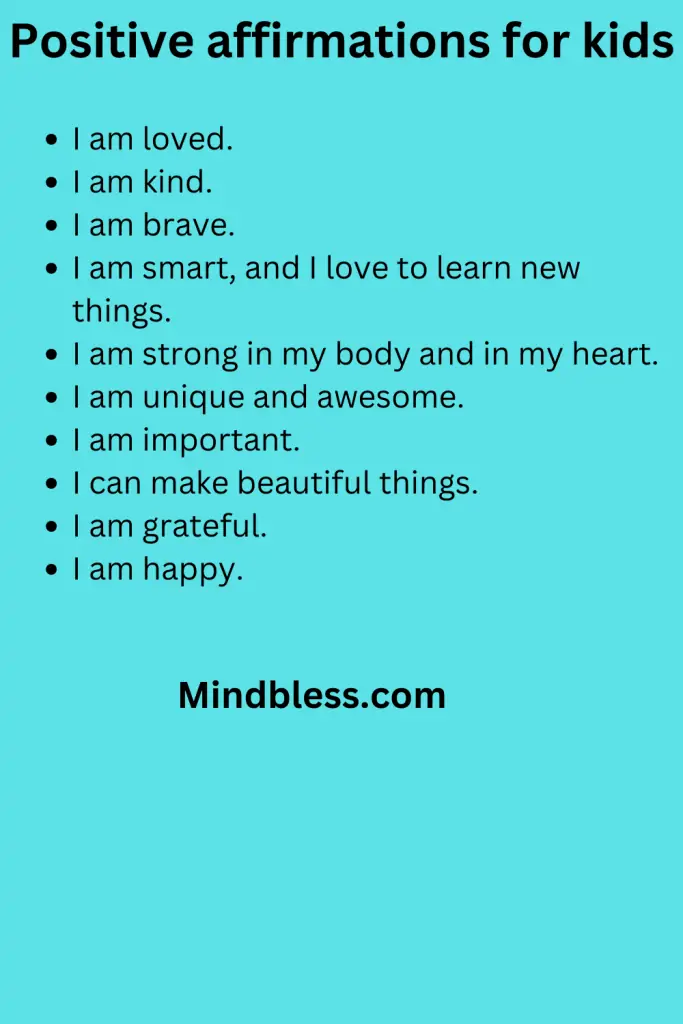Table of Contents
ToggleI’ve been using positive affirmations in my daily routine to inspire and keep myself grounded. It’s funny, i only started using them a few years ago, and it got me thinking about how much they could have helped me if i’d known about them earlier. Imagine if my parents or teachers had introduced them to me when i was younger!
So, let’s dive into a list of positive affirmations for your child or students. These affirmations are like little tools that can encourage your kid and help build self-love. We’ll cover different situations and explore how affirmations for kids can be a fantastic resource for them.
Affirmations for kids
First up, we’re going to talk about affirmations for kids in different age groups. After that, we’ll dive into affirmations tailored to different emotions. So, we’ve got a lot of ground to cover, and it’s going to be a helpful journey.
For younger children 3 to 8 years old:
- I am loved.
- I am kind.
- I am brave.
- I am smart, and i love to learn new things.
- I am strong in my body and in my heart.
- I am unique and awesome.
- I am important.
- I can make beautiful things.
- I am grateful.
- I am happy.
For older children 9 to 13 years old:
- I believe in myself, and i can achieve my goals.
- I am resilient, and i can bounce back from challenges.
- I am capable of handling whatever comes my way.
- I am confident in my abilities and talents.
- I am kind, and i make a positive impact on others.
- I am responsible, and i take ownership of my actions.
- I am a good friend, and i value my relationships.
- I am open to learning and growing every day.
- I am in control of my thoughts and emotions.
- I am unique, and i embrace my individuality.
Positive affirmations for kids
In this part, we’ll explain about affirmations for specific emotions your child might be experiencing. These little positive sayings can come in handy when your child needs a little extra encouragement or a mood boost. It’s all about helping them navigate those tricky emotions!
Happiness
- I choose to be happy every day.
- Happiness starts from inside, and i am full of joy.
- I find joy in the little things around me.
- I am grateful for the happiness in my life.
- I spread happiness with my smile and laughter.
- Happiness is a choice i make every day.
- I am deserving of all the happiness that comes my way.
- I am filled with happiness, and it radiates from me.
- I am cheerful and positive.
- I can create my own sunshine, even on a cloudy day.
Confidence
- I believe in myself and my abilities.
- I am confident in everything i do.
- I am capable of handling any challenge that comes my way.
- I am strong, inside and out.
- I trust my instincts and make good choices.
- I am proud of who i am and what i can do.
- I can learn and improve in anything i set my mind to.
- I am unique and special just the way i am.
- I am not afraid to express my thoughts and ideas.
- I have the courage to be myself, no matter what.
Self-love
- I am unique, and that’s what makes me special.
- I am deserving of love and kindness, especially from myself.
- I treat myself with respect and care.
- I am grateful for the person i am becoming.
- I appreciate my strengths and embrace my weaknesses.
- I love every part of me, inside and out.
- I am a valuable and lovable person.
- I am proud of who i am, and i cherish my own heart.
- I love and accept myself just as i am.
- I am kind to myself, even when i make mistakes.
Resilience
- I am a problem solver, and i can find solutions.
- I learn from my mistakes and use them to grow.
- I don’t give up easily; i keep trying until i succeed.
- I believe in myself, and that’s my greatest strength.
- I adapt to change and keep moving forward.
- I am not defined by my problems; i am defined by my resilience.
- I have the power to turn challenges into opportunities.
- I am strong and i can overcome anything life throws at me.
- I can handle tough situations and come out stronger.
- I have the strength to face difficult times with courage.
Kindness and empathy
- I listen to others with an open heart and mind.
- I am empathetic, and i understand how others feel.
- I help those in need because it is the right thing to do.
- I make the world a better place by showing kindness daily.
- I am a good friend who cares about others.
- I use my words to uplift and encourage those around me.
- I see the beauty in our differences and embrace differences.
- I spread kindness like confetti, and it makes the world a brighter place.
- I am kind, and i treat others the way i want to be treated.
- I stand up against bullying and support those who are hurt.
Learning and growth
- I believe in my ability to improve and grow.
- I embrace challenges as opportunities to learn.
- I am patient with myself as i study new skills.
- I ask questions when i need help, and that’s how i learn.
- I use my imagination and creativity to solve problems.
- I know that learning is an adventure, and i’m on a great journey.
- I can do anything i set my mind to with effort and practice.
- I am excited about the possibilities that come with learning and growing.
- I love to learn new things every day.
- I am not afraid of making mistakes because they help me learn.
Creativity and imagination
- I dream big and my imagination has no limits.
- I enjoy exploring new ways to express myself.
- I see the world as a canvas for my imagination.
- I embrace new ideas and enjoy thinking outside the box.
- I find inspiration in everyday things around me.
- I am open to trying new things and discovering new talents.
- I believe in my ability to create amazing things.
- I am creative and my imagination knows no bounds.
- I love to create art, stories, and adventures.
- I am a creative thinker, and my ideas are unique.
Gratitude
- I appreciate the little things that make me smile.
- I find joy in being grateful for what i have.
- I appreciate the beauty of the world around me.
- I am thankful for the food that nourishes me.
- I feel gratitude in my heart for each new day.
- I am thankful for the kindness of others.
- I am grateful for the chance to learn and grow.
- I am grateful for all the love in my life.
- I am grateful for the opportunities that come my way.
- I am joyful for my family and friends.
Responsibility
- I take care of my belongings and keep them organised.
- I finish my tasks before i play or have fun.
- I am accountable for my homework and schoolwork.
- I make good choices that keep me safe and healthy.
- I own up to my mistakes and learn from them.
- I understand the importance of keeping my promises.
- I am responsible for making the world a better place.
- I help with chores and contribute to my family.
- I am reliable and people can count on me.
- I am responsible for my actions and choices.
Mindfulness and relaxation
- I take deep breaths to relax and find my inner peace.
- I am aware of the present moment.
- I am in control of my thoughts and emotions.
- I let go of worries and focus on what’s happening now.
- I give myself permission to take breaks and unwind.
- I practice kindness and self-compassion every day.
- I am grateful for moments of peace and relaxation.
- I am calm and at ease in my body.
- I release tension and stress with each breath.
- I find joy in stillness and silence.
Friendship and social skills
- I treat others with kindness and respect.
- I am open to making new friends and learning from them.
- I am patient and understanding with my friends.
- I use my words to solve problems calmly.
- I am a good friend who cares about others.
- I know how to share and co-operate with others.
- I stand up against bullying and support those who are hurt.
- I appreciate the differences in others and celebrate them.
- I create a positive and welcoming environment for all.
- I listen when others talk and show empathy.
Tips on how to effectively use positive affirmations with your kid
- Consistency: incorporate affirmations into your daily routine, such as during breakfast or before bedtime, to make them a habit.
- Simple language: use age-appropriate language and keep affirmations short and easy to understand.
- Teamwork: ask your child to repeat the affirmations after you, making it a collaborative experience.
- Positive language: ensure that the affirmations focus on positivity and are framed in a way that emphasises what your child can do or become.
- Visual tools: use visual aids like posters or flashcards with affirmations to make them more engaging for younger children.
- Playtime: create games or activities around affirmations to make learning fun and interactive.
- Reinforce in real-life situations: encourage your child to use affirmations in challenging situations, so they can apply these positive messages when they need them most.
Are positive affirmations good for kids?
Absolutely, positive affirmations can do wonders for kids. Let me break it down for you in bullet points:
- Boost self-esteem: positive affirmations can help improve a child’s self-esteem and self-worth.
- Foster a positive mindset: they encourage a positive and optimistic outlook on life.
- Develop resilience: affirmations can teach children to bounce back from challenges and setbacks.
- Enhance confidence: repeating positive statements can boost a child’s self-confidence.
- Promote emotional well-being: affirmations can help kids manage stress, anxiety, and other negative emotions.
- Improve focus: they can enhance concentration and help children stay on track with their goals.
- Build healthy relationships: positive affirmations can also encourage kindness and empathy, improving their social skills.
- Enhance problem-solving skills: affirmations can also reinforce a growth mindset and the idea that challenges are opportunities to learn.
- Encourage self-love: they can teach children to appreciate and love themselves as they are.
- Create a positive family environment: using affirmations together as a family can promote a positive and supportive atmosphere.
Parent testimonials and success stories
I began using affirmations as a fun before-school activity and found that my children seemed a lot more confident and would walk into the school gates in the morning smiling. They seem a lot more sure of themselves and have also started to remind one another of affirmations if they see their sibling is a bit upset. I would recommend parents to start incorporating affirmations to see your child develop more self-confidence.
Expert advice and additional resources
There are loads of psychological articles out there that talk about the benefits of affirmations. Experts say it can boost our health and, in some cases, even improve how well we do in school. If you’re curious and want to dig deeper, i’ve dropped a couple of links below to some psychological studies you can check out in your own time for all the details:
- mckay, m. , & fanning. P. (2016). Self esteem
- downing, c. J. (1986). Affirmations
Positive affirmations for kids are a really effective way of being compassionate to ourselves, providing our minds with a better, more balanced view of ourselves. Michelle obama, us attorney and former first lady of the usa.
Theyre about the idea that language is powerful and if we limit ourselves with our language we will always remain within the confines of that. With positive self-talk, were saying i dont have to limit myself. Youre confirming to yourself that things can be done to bring about change or promote positive action. (positive affirmations article | mental health and wellbeing … – bbc) dr anisa-rees moses, educational and child psychologist.
Affirmations are any act that underscores one’s adequacy and reaffirms one’s sense of self-integrity. (the science behind self-affirmations | psychology today) david bredehoft, ph. D. , chair of psychology at concordia university.
Positive affirmations for kids-printable free
We have also provided a link to a free downloadable resource which you use to download all of the affirmations we have listed on this article so you can have them all in one place to use whenever you like!
Conclusion
Positive affirmations for kids are a wonderful addition to a child’s daily routine, whether you’re a family member or an educator. They play a vital role in creating a positive and nurturing atmosphere for your child, while also promoting self-love as they grow and develop. Drawing from both my professional background as a psychologist and my personal experience, i firmly believe that affirmations are a valuable tool to introduce at an early age.
FAQ
What age group are these positive affirmations suitable for?
The affirmations are simple enough to be used on children ranging from age 3 to early adolescence, however i believe these affirmations are universal for any age so i would suggest to even use them for yourself if you find them useful!
Are affirmations good for kids?
Affirmations can be a valuable tool for boosting your child’s or students’ self-esteem. However, it’s important to remember that these affirmations should always serve as a source of support, rather than a means to set unrealistic expectations for your child.
How do i start daily affirmations with my child?
To kickstart your day with a positive tone, consider incorporating affirmations in your morning routine before your child heads off to school. Beginning with mutual repetition is a fantastic way to ease them into the practice and gauge their response to affirmations. Once they become accustomed to affirmations as part of the morning routine, you can turn it into a fun and creative activity, like creating affirmation flashcards through painting or other creative means.
How often should i use positive affirmations with my child?
I’d recommend relying on your instincts because the effectiveness of affirmations can vary from one child to another. Some kids may enthusiastically embrace them and make them a regular part of their routine, while others might be a bit slower to warm up to the idea.
One approach you can try is to start with mutual repetition of the affirmations and see how your child responds. To make it inviting, you could gently ask your child in the morning something like, “how about beginning this beautiful day with some affirmations? ” if your child shows excitement and interest, that’s a positive signal to proceed. If not, it might be best to wait for another day. The aim is to make this process feel natural, and for your child to associate affirmations with a positive and uplifting experience, rather than viewing them as just another chore before the school day.
Author
-
I have a BSc in Psychology and also MSc in Positive Psychology, as well as accreditation from the BPS (British Psychological Society). I have been working in the Psychology industry for 4 years.



